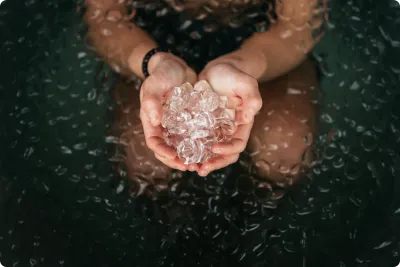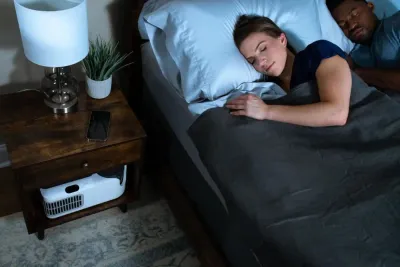The Rise of Cold Plunges: Benefits, Sleep Impact & Why Everyone’s Doing It
Chilipad Editorial Team • May 30, 2025

Key Takeaways
Cold plunges can support recovery, but timing and individual health matter.
- Cold plunges may help reduce inflammation and muscle soreness, supporting recovery after intense training.
- Cold exposure can boost alertness and mood, but doing it too close to bedtime may delay falling asleep.
- Timing matters: cold plunging earlier in the day tends to support recovery, while late-night plunges can disrupt sleep onset.
- Cold plunging is not suitable for everyone and should be avoided by people with cardiovascular conditions unless approved by a healthcare provider.
Cold plunges can support muscle recovery and daytime alertness, but their effect on sleep is not automatically positive.
While cold exposure may reduce soreness and help you feel more awake, doing it too close to bedtime can spike alertness and delay sleep.
The real benefit comes down to timing, duration, and how your body responds to cold.
What is a Cold Plunge?
A cold plunge, sometimes called an ice bath, involves immersing your body in water below 60°F (15°C). This practice dates back centuries, rooted in traditions that valued the health benefits of alternating hot and cold exposure.
Today, cold plunges are popular among athletes and wellness enthusiasts alike, recognized for their role in recovery, energy, and overall well-being.
The Popularity Surge
Cold plunges have gone from niche recovery tool to mainstream wellness trend, thanks in part to athletes and celebrities like Harry Styles, Lady Gaga, and David Beckham. What started as a way for athletes to speed up recovery has become a go-to ritual for anyone looking to boost energy, sharpen focus, and support overall well-being.
So how did sitting in ice water become a wellness staple? Check out The History of the Ice Bath to see how this ancient practice found its way into modern recovery routines.
In a 2023 study, it showed that cold-water immersion can help reduce muscle soreness, support weight management, and even improve mood by increasing noradrenaline and dopamine levels. [1] It’s no longer just for elite athletes—cold plunges are attracting a wider audience eager to experience both the physical and mental benefits.
Take Temperature Control to the Next Level
Pair your cold plunge routine with the Chilipad for all-night cooling comfort. With precise temperature control, the Chilipad helps you stay cool, fall asleep faster, and wake up refreshed—no ice bath required.
The Many Benefits of Cold Plunge
Ready to take the plunge? Here’s a quick breakdown of the cold plunge benefits for your body and mind:
Muscle Recovery
For athletes, cold plunges can be a powerful tool to ease post-workout soreness. The cold water causes blood vessels to constrict, which may help limit inflammation and swelling in overworked muscles. This process also helps flush out waste products, supporting quicker healing and recovery so you can get back to training sooner.
Enhanced Mood and Mental Clarity
Cold water immersion can spark the release of endorphins, often lifting mood and easing feelings of stress or anxiety. Many people describe a sense of euphoria after a plunge, along with greater mental resilience and clarity.
Regular practice has also been linked to sharper focus and improved cognitive function, making it as much a boost for the mind as it is for the body.
Stress Reduction
Cold-water immersion can act as a natural stress reliever. In a study from the University of South Australia, participants reported feeling less stressed within 12 hours of exposure. [2]
For those managing high-pressure environments or simply looking to support overall well-being, cold plunges may offer a refreshing way to reset both body and mind.
Immune System Boost
Some research suggests that regular cold exposure may help strengthen the immune system, potentially reducing the risk of illness and supporting overall health.
While the long-term effects are still being studied, early findings point to promising benefits for immune function.
Improved Sleep Quality
Cold plunges may improve sleep quality by activating the parasympathetic nervous system, promoting relaxation and deeper, more restorative sleep. [3]
A systematic review published in PLoS One found that participants experienced reduced stress levels and improved sleep outcomes after cold-water immersion. [4] However, timing is key.
Taking a cold plunge too close to bedtime can leave some people feeling too alert to fall asleep easily.
How Cold Plunge Impacts Sleep
Wondering what a cold plunge does for your sleep? Here’s a look at the possible benefits and drawbacks.
Melatonin Production
Cold exposure may stimulate melatonin. Its the hormone that helps regulate your sleep cycle. By lowering core body temperature, cold plunges can create the right conditions for better rest.
In fact, a study on swimmers who regularly practiced cold-water immersion found improvements in sleep quality, pointing to potential benefits for those dealing with sleep troubles. [5]
Activation of the Parasympathetic Nervous System
Cold plunges stimulate the parasympathetic nervous system—the part of your body that encourages relaxation and energy conservation. [6] This shift can make it easier to unwind and drift off to sleep.
The cold-water “diving reflex” further supports this process by countering the drop in parasympathetic activity that stress or intense exercise can cause, ultimately promoting deeper, higher-quality rest.
Increased Slow-Wave Sleep
Cold plunges may support slow-wave sleep—the deepest stage of rest that’s vital for muscle repair, immune health, and mental sharpness. By lowering core body temperature, cold exposure encourages relaxation and helps the body slip into this restorative phase more efficiently.
Best Times for Cold Plunging
Timing matters when it comes to cold plunges, especially for recovery and sleep. Taking the plunge right after a workout can help reduce inflammation, clear out metabolic waste, and decrease muscle soreness (so long, DOMS).
It’s no surprise that many athletes make cold exposure a regular part of their recovery playbook.
- Morning: Start your day with a cold plunge to wake up your body, sharpen focus, and give your metabolism a jump-start. It’s a quick way to boost energy and mental clarity.
- Post-Workout: After tough training, a plunge can help ease inflammation, speed recovery, and keep muscle soreness in check.
- After Sauna or Heat Therapy: Pairing hot and cold (contrast therapy) promotes circulation, supports lymphatic drainage, and enhances overall recovery.
- Before Bedtime: Take a plunge 1–2 hours before sleep—enjoy the initial energy lift, then let your body naturally settle into a calmer state, making it easier to drift off without restlessness.
Make sure you keep it brief. Cold plunges don’t need to be long to work. Just a couple of minutes is enough to lower core temperature and cue your body to relax. Even a quick two-minute dip can make a noticeable difference in how fast you fall asleep and how deeply you rest.
Potential Drawbacks: Before Bed
While cold plunges have benefits, they may not always be the best choice right before you go to bed. For some, the sudden shock of cold water can feel stressful, especially if your body isn’t used to it.
That initial jolt might cancel out the calming effect you expect afterward. Cold exposure also triggers stress hormones like cortisol, which can boost alertness and energy, making it difficult to relax and fall asleep.
Times to Avoid: It's best to avoid within 2 to 3 hours of bedtime and late evening sessions for people sensitive to cold.
Who Should Be Cautious With Cold Plunges
Even though it's a "hot" trend, cold plunges aren't for everyone. The sudden cold shock can trigger stress responses that may outweigh the benefits for certain people.
- People with heart conditions: Cold exposure can cause rapid changes in heart rate and blood pressure, which may increase cardiovascular risk.
- Individuals with blood pressure issues: The cold shock response can temporarily raise blood pressure and strain the nervous system.
- Those prone to panic or anxiety responses: Cold plunges can activate a fight or flight response, potentially worsening anxiety or triggering panic symptoms.
- Anyone with sleep disorders worsened by adrenaline spikes: Cold exposure increases alertness hormones, which may delay sleep onset or disrupt sleep quality when done too close to bedtime.
If any of these apply, cold plunging should only be considered with medical guidance.
Safety Considerations
Cold plunges can be great for your health, but safety should always be a top priority. If you have any medical conditions, talk to your doctor before trying it. Beginners should start slow—an ice-filled bathtub at home is an easy way to let your body adjust to the cold gradually.
Final Thought
Cold plunges are a growing wellness trend, known to support muscle recovery, boost mood, and even improve sleep. As more people add cold exposure to their routines, it’s helpful to understand how timing can affect sleep.
Whether you’re an athlete or just looking to feel refreshed, cold plunges can be an energizing addition to your wellness habits.
Frequently asked questions
What Is a Cold Plunge Good For?
A cold plunge isn’t just a trend—it’s a multitasking wellness hack. It’s great for:
- Easing muscle soreness
- Jumpstarting recovery
- Improving circulation
- Calming inflammation
- Boosting mood
- Improve your sleep
- May boost immune function
Think of it as nature’s reboot button for your body and mind.
Does cold plunging improve sleep quality?
Cold plunging does not directly improve sleep quality for most people and may disrupt sleep if done too close to bedtime. Any sleep benefit usually comes from improved recovery earlier in the day.
How cold should a cold plunge be?
Most research uses water temperatures between 50°F and 59°F. Colder temperatures do not automatically increase benefits and may increase stress response.
How long should you stay in a cold plunge?
Short sessions of 1 to 3 minutes are commonly used. Longer exposure increases strain without clear added benefit.
Is a cold plunge better than a cold shower?
Cold plunges provide consistent temperature exposure, while cold showers vary. Both can stimulate alertness, but neither guarantees better sleep.
Peer-Reviewed Research References
-
Yankouskaya, A., et al.
Short-Term Head-Out Whole-Body Cold-Water Immersion Facilitates Positive Affect and Increases Interaction Between Large-Scale Brain Networks.
Biology, 2023;12(2):211.
Study Type: Experimental Human Neuroimaging Study
Key Finding: Demonstrates that short-term cold-water immersion enhances positive mood and increases functional connectivity between major brain networks associated with emotional regulation, attention, and stress resilience.
View Study
Source URL: https://pmc.ncbi.nlm.nih.gov/articles/PMC9953392/
-
News Medical.
Study Explores the Effects of Cold-Water Immersion on Health and Wellbeing.
News-Medical, 3 Feb. 2025.
Resource Type: Medical Science News Summary
Key Finding: Summarizes recent research suggesting that cold-water immersion may influence mood, inflammation, immune response, and stress regulation, while noting that benefits vary based on duration, frequency, and individual health status.
View Resource
Source URL: https://www.news-medical.net/news/20250203/Study-explores-the-effects-of-cold-water-immersion-on-health-and-wellbeing.aspx
-
Chauvineau, M., et al.
Effect of the Depth of Cold Water Immersion on Sleep Architecture and Recovery Among Well-Trained Male Endurance Runners.
Frontiers in Sports and Active Living, 2021;3:659990.
Study Type: Controlled Athletic Recovery Study
Key Finding: Finds that deeper cold-water immersion alters sleep architecture by increasing slow-wave sleep and improving perceived recovery, suggesting a potential role for cold exposure in post-exercise sleep quality.
View Study
Source URL: https://pmc.ncbi.nlm.nih.gov/articles/PMC8044518/
-
Cain, T., et al.
Effects of Cold-Water Immersion on Health and Wellbeing: A Systematic Review and Meta-Analysis.
PLOS ONE, 2025;20(1):e0317615.
Study Type: Systematic Review & Meta-Analysis
Key Finding: Concludes that cold-water immersion may offer short-term benefits for mood, inflammation, and recovery, but emphasizes inconsistent evidence, potential risks, and the need for standardized protocols and long-term safety data.
View Study
Source URL: https://journals.plos.org/plosone/article?id=10.1371/journal.pone.0317615
-
News Medical.
Study Explores the Effects of Cold-Water Immersion on Health and Wellbeing.
News-Medical, 3 Feb. 2025.
Resource Type: Secondary Medical News Resource
Key Finding: Reviews findings from recent cold-water immersion studies and highlights expert cautions regarding cardiovascular stress, cold shock response, and the importance of gradual exposure.
View Resource
Source URL: https://www.news-medical.net/news/20250203/Study-explores-the-effects-of-cold-water-immersion-on-health-and-wellbeing.aspx
-
Cleveland Clinic.
Parasympathetic Nervous System (PSNS): What It Is & Function.
Cleveland Clinic, 6 June 2022.
Resource Type: Medical Education Resource
Key Finding: Explains how activation of the parasympathetic nervous system promotes relaxation, lowers heart rate, supports recovery, and counterbalances the stress response—mechanisms often cited in cold exposure and breathwork research.
View Resource
Source URL: https://my.clevelandclinic.org/health/body/23266-parasympathetic-nervous-system-psns









